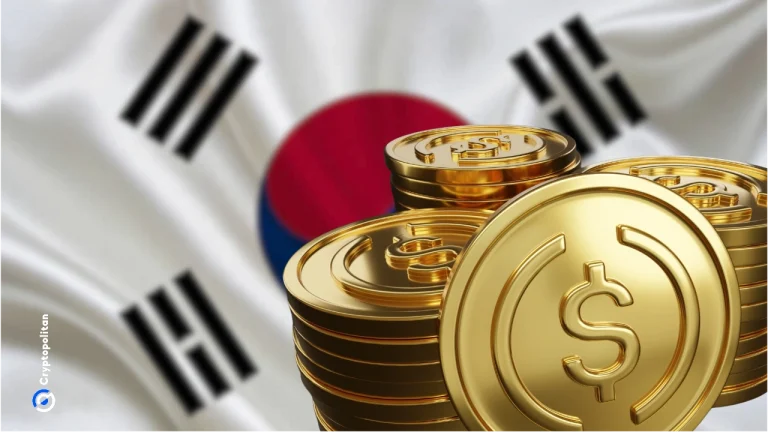Key Takeaways
- IQ and Frax have launched KRWQ, the first stablecoin pegged to the South Korean won (KRW) on Base, Coinbase’s Ethereum Layer 2 network.
- The KRWQ stablecoin leverages the Stargate bridge and LayerZero’s OFT standard for cross-chain transfers and aims to attract institutional interest with Frax’s compliance framework.
- Currently, KRWQ is not available to South Korean residents due to a lack of local regulatory clarity, with minting and redemption limited to institutional partners.
- South Korea is actively developing stablecoin legislation, with a proposed amendment to the Foreign Exchange Transactions Act that could classify stablecoins as legal means of payment.
- The dominance of USD-pegged stablecoins like Tether (USDT) highlights a growing demand for other fiat-backed digital currencies in global markets.
IQ and Frax Launch KRWQ Stablecoin on Base
IQ, in collaboration with the decentralized finance protocol Frax, has introduced KRWQ, a new stablecoin designed to be pegged to the South Korean won (KRW). This marks a significant development as KRWQ becomes the first won-denominated stablecoin available on Base, Coinbase’s Ethereum Layer 2 network.
Announced via a joint news release, KRWQ is positioned as the first Korean won-backed multichain stablecoin. It utilizes the Stargate bridge and LayerZero’s Omnichain Fungible Token (OFT) standard to enable seamless transfers across multiple blockchains. The stablecoin’s initial trading commenced with the KRWQ/USDC pair on the decentralized exchange Aerodrome.
IQ indicated that its partnership with Frax aimed to integrate robust compliance and institutional safeguards, drawing inspiration from Frax’s successful frxUSD system to foster institutional adoption.
Navin Vethanayagam, Chief Brain of IQ, stated, While USD-backed stablecoins dominate today, no credible won-denominated stablecoin has ever launched at scale. KRWQ fills a critical gap in the market. This launch follows closely on the heels of Japan’s introduction of a globally tradable and redeemable digital yen, backed by domestic deposits and Japanese government bonds.
Won Stablecoin Not Yet Accessible to South Korean Residents
KRWQ is currently accessible on the Base network and other supported blockchains. However, it is not yet being actively marketed or offered to individuals residing in South Korea due to the absence of specific regulatory frameworks governing such assets locally. According to IQ and Frax, the minting and redemption processes are presently restricted to eligible counterparties, including exchanges, market makers, and institutional partners.
IQ has further clarified that KRWQ is intended to be the pioneer fully regulatory-compliant stablecoin in Korea. Its development anticipates forthcoming legislation currently under review by the National Assembly.
Last month, South Korean digital asset custody provider BDACS introduced KRW1, another stablecoin pegged to the won, on the Avalanche network. However, BDACS characterized KRW1 as a proof-of-concept due to the prevailing regulatory uncertainty in the country.
Since the election of President Lee Jae Myung in June, South Korea has accelerated its plans to establish a local currency-pegged stablecoin market. This initiative is part of a broader strategic effort to bolster the nation’s monetary sovereignty, aligning with upcoming laws that will integrate stablecoins into its digital economy.
South Korea’s Evolving Stablecoin Legislation Landscape
South Korea is in the process of enacting its first law specifically addressing stablecoins, operating under the umbrella of the Foreign Exchange Transactions Act. Officials from the National Assembly have indicated that the proposed amendment could potentially classify stablecoins as legal means of payment, placing them in a similar category to government-issued currency and bank notes.
Representative Park Sung-hoon of the dominant opposition People Power Party introduced the bill, noting that stablecoins currently fall outside existing legal definitions despite their growing popularity within the Asian region. This situation highlights the necessity for updated legal frameworks to accommodate the evolving digital asset landscape.
Data from the Financial Supervisory Service (FSS) reveals significant coin flows between Huione Guarantee, a virtual asset platform linked to the Cambodia-based Huione Group, and five major South Korean exchanges, including Upbit and Bithumb. These transactions reached approximately 12.8 billion won ($8.9 million USD) last year.
This volume represents a substantial increase, multiplying by approximately 1,400 times compared to the 9.22 million won recorded in the previous year. Notably, 99.9% of these transactions were conducted using Tether (USDT), a stablecoin pegged to the US dollar.
South Korean authorities have been cautious in passing comprehensive legislation, largely due to concerns over the potential misuse of stablecoins in illicit financial activities. The US and UK governments have previously sanctioned Huione Group for alleged fraud and laundering of stolen funds, leading to Huione Guarantee being designated as a high-risk platform for fund transfers.
Global Demand for Diverse Fiat-Backed Digital Currencies
The substantial presence of the US dollar in the stablecoin market has underscored the urgency for legislative responses from governments worldwide, including South Korea and Japan. According to reports from the Korean Times, Chairman Lee Eog-weon of the Financial Services Commission (FSC) stated that the upcoming bill concerning stablecoins is nearing the final stages of coordination among relevant ministries.
In a recent interview with a local publication, Tether CEO Paolo Ardoino suggested that only a limited number of countries are strategically positioned to issue national stablecoins at scale, with South Korea being one of them. He further commented on the potential impact of the Korean won in global transactions, particularly within the technology sector.
I think the Korean won is going to be one of the most important currencies for settling transactions and tech-related commodity trades, as well as international agreements for access to new technology, Ardoino surmised, highlighting the potential for localized stablecoins to play a significant role in international commerce.
Expert Summary
The launch of KRWQ by IQ and Frax signifies a key development in the stablecoin market, introducing the first won-pegged stablecoin on the Base network. While regulatory hurdles in South Korea currently limit access for local residents, the country is actively working towards establishing a legal framework for stablecoins. The global trend indicates a growing need for diverse fiat-backed digital currencies beyond the US dollar.

